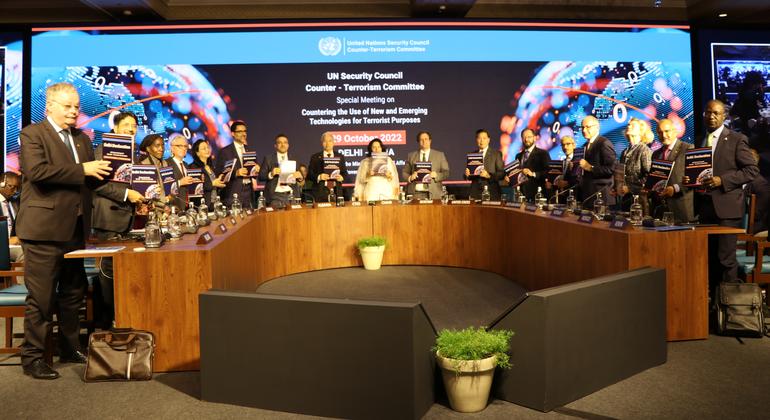UN Security Council boosts commitment to fight digital terrorism |

A non-binding document, known as the Delhi Declaration on countering the use of new and emerging technologies for terrorist purposes was adopted in the Indian capital on Saturday, following a series of panels involving Member State representatives, UN officials, civil society organizations, the private sector, and researchers.
The announcement aims to cover the main concerns surrounding the misuse of drones, social media platforms, and crowdfunding, and create guidelines that will help address the growing issue.
“The Delhi Declaration laid the foundation for the way forward,” said David Scharia from the Counter-Terrorism Executive Committee. “He talked about the importance of human rights, public-private partnership, civil partnership, and how we can work together on this challenge. He also called CTED [the Secretariat for the Committee] to develop a set of guidelines, which will result from intensive thinking with all partners. “
Human rights at the core
Respect for human rights is heavily emphasized in the document, and during the debates. The Secretary General of the UN, António Guterres, emphasized that there must be “strict measures to reduce these vulnerabilities while working to protect all human rights in the digital space.”
In a video message, Mr. Guterres added that human rights can only be achieved through effective multilateralism and international cooperation, with answers contained in the values and commitments of the United Nations Charter and the Universal Declaration of Human Rights. Humanity.
Representing the Office of Human Rights, Scott Campbell, who leads the digital technology group, reviewed the Secretary-General, explaining that “respect for rights when dealing with terrorism is fundamental to ensure the a sustained and effective effort to protect our security.”
“Methods that cross these critical lines not only violate the law, but they also undermine efforts to combat terrorism by destroying the trust, networks, and community that are essential to prevention and a successful response,” he said.
Mr. Campbell argues that international law and human rights present many answers to the issue, remembering that Member States have the responsibility to protect the safety of their populations and to ensure that their behavior does not violate any human rights.
Regulation and censorship
He also stressed that companies and States should be careful when processing and blocking social media content, because it can “affect minorities and journalists in unfair ways.”
To overcome the issue, Mr. Campbell suggested that restrictions should be based on clear and narrow rules, and should not encourage censorship of legitimate expression. He argued that they should have transparent procedures, truly independent and impartial supervisory bodies, and that civil society and experts should be involved in the development, evaluation, and implementation of procedures.
During the closing session of the meeting, the chairman of the committee, Ambassador Ruchira Kamboj of India, stated that the outcome document takes into account the challenges and considers “practical, practical, and intellectual possibilities to address the opportunities and threats that exist through the use of new and emerging technologies for terrorist purposes. “
He added that the global policy-making community “must be agile, forward-thinking, and collaborative” to meet the changing needs of States facing new challenges from digital slavery.







